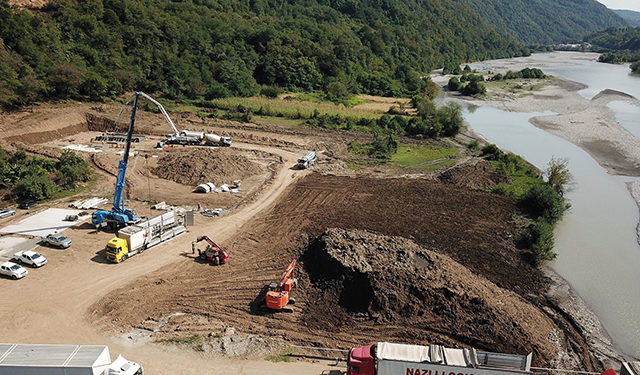Media outlet “Mtis Ambebi” (Mountain News) obtained a report made by the Ministry of Justice in March 2019, which negatively assessed the Namakhvani HPP agreement. The contract for construction, ownership, and operation of the Namokhvani HPP cascade was signed between the investor and the Government of Georgia on April 25, 2019. The document was not made public.
the MoJ assessment is critical and contains 22 notes.
As Mtis Ambebi claims, the report exposes Prime Minister Irakli Garibashvili, who, in response to a protest by Rioni Valley guards, said a few weeks ago that he had instructed the Ministry of Justice to evaluate the contract. The Prime Minister hid from the people that such a conclusion already existed and was known to the government two years ago.
1. Contract Draft 1.1. In the article, the term “affiliated persons” includes the parties to the agreement on behalf of Georgia; Among them is “Energotrans”, which is not a party to this agreement. Thus, we believe that this provision needs to be corrected and Energotrans removed from this definition. However, in accordance with this note, the independent term denoting this entity – “Energotrans” needs to be corrected, as well as the reference to it as a contact entity in Article 19 of the draft contract.
2. Contract Draft 1.1. The last sentence of the term “change of legislation” within the article should refer not to the previous part, which provides for an exception, but to the general provision of this provision as to what conditions the change in legislation must meet in order to explain its purpose for this article.
3. The meaning of the term – “case of expropriation” is quite broad and expropriation includes such cases, which can be interpreted as “changes in the law”, which is a separate legal category according to the contract. Thus, we consider that the circumstances specified in part (iii) of this term should be removed from the content of the term in question, both for general and specific reasons.
4. The term “electricity purchase agreement” refers to the “Government of Georgia” as a party to this agreement, along with other parties, While the Government of Georgia does not represent a party to the “Electricity Purchase Agreement”. Thus, this discrepancy needs to be corrected.
5. The term “project participants” gives a fairly broad definition of these persons, especially because of the reference to any “contractor” under this provision. It follows that the contractual obligations of the government and other government agencies apply to a wide range of “project participants”, which requires further evaluation as appropriate. This note is especially important in cases where there is already a high risk to the government of fulfilling specific obligations to the essential participants of the project.
6. It should be specified that the Government of Georgia “makes every effort within its competence …” to assist in the implementation of the project and not – makes a full commitment to the implementation of this project.
7. Exemption from the obligation to obtain a company license requires additional assessment, taking into account the legislation of Georgia and the position of the relevant competent authority.
8. It should be evaluated in terms of expediency the issue of leaving the draft contract in Article 3.2.5 of the contract.
9. The issue of the state’s commitment to implement the procedures provided for by the legislation of Georgia in connection with the transfer of non-agricultural land within the framework of a contract with a private person requires additional assessment, the issue of exemption from company taxes requires further assessment by the relevant competent authority.
10. The obligation of the designated government to procure invoices needs to be assessed in detail.
11. Section 3.2.16 of the draft contract requires further evaluation in terms of expediency.
12. With regard to Article 3.2.20 of the draft contract, it should be noted that due to the rather general nature of this article, according to its last sentence, It is considered as a case of compensation for non-compliance by the government and requires further evaluation in terms of expediency.
13. We consider it inappropriate for the existing regulation of the draft contract, according to which, in case of payment of fines by the company, the amount of guarantees provided by the company should be reduced in proportion to these payments. Thus, the said mechanism should be removed from the text of the contract.
14. 4.4.4 of the draft contract. Regarding the article, which allows the company to pay only a fine in favor of the government, we note that according to Part 2 of Article 419 of the Civil Code of Georgia, the creditor always has the right to claim damages in parallel with the payment of a fine, if such damage occurs. Thus, we consider that the above article of the draft contract needs to be amended in accordance with the right granted to the creditor by the Civil Code.
15. The issue of leaving the content of Article 5 of the Agreement as amended needs to be further assessed, taking into account the position of the relevant competent body – the Ministry of Environment and Agriculture of Georgia.
16. In contract law, in general, based on the definition of force majeure, which in turn implies events and circumstances that are not under the control of either party, we consider it inappropriate to use this legal category as a mechanism for punishing the contracting party, which appeals to draft law 8.1.8. And Articles 8.2.1:Especially in the event that most of the circumstances arising from force majeure, despite their pre-determined nature and the acknowledgment of the absence of fault of the party, still apply to one party to the contract – The Government of Georgia, and also its responsibility, in the context of the definition of force majeure as a “compensated case”.
17. Should specify the obligation of the designated government – to reimburse the relevant case, limited to the part of the amount that was not paid by the “relevant public institution” on the basis of other relevant agreements.
18. The reservation given in parentheses should be removed, as it unreasonably expands the meaning of “relevant public institution” for the purposes of this article.
19. The content of Article 9.4 of the draft contract needs further evaluation due to the expediency, including the position of the Ministry of Finance of Georgia.
20. The record of the paragraph on the mandatory nature of the audit report requires further evaluation.
21. Regarding Article 12.3.7 of the draft agreement, we note that, given its content, there is a risk that it will be interpreted as the refusal of “sovereign immunity” by the Government of Georgia. In view of the above, we consider it expedient to remove the mentioned provision from the draft agreement.
22. It is advisable to add a reference to Article 21 of the draft contract on the exclusion of damage caused by negligence from the regulation of the article.
The full document and notes can be found here
Source of information: mtisambebi.ge
By Ketevan Skhirtladze














